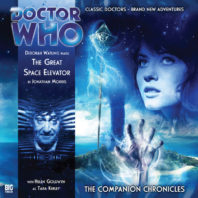
Released August 2008
The Companion Chronicles returns to the Second Doctor era with Jonathan Morris’s ‘The Great Space Elevator,’ this time with Deborah Watling taking centre stage as Victoria Waterfield recounts an adventure involving a dangerous alien plot looking to exploit the technological marvel that stretches from the equator to a space station held in geosynchronous orbit.
Victoria did not always receive the most in-depth development on screen, meaning that once again this range provides a glowing opportunity to further explore a character who featured so long ago. Here, Victoria is a wife and mother with a grandchild due soon, and although she has never told her family who she is or the truth behind her origins, she has also never forgotten the most exciting and terrifying days of her life alongside the Doctor and Jamie. Indeed, on the space station above Sumatra, Victoria is more than willing to face danger to find the answers she requires, in the process lambasting and refuting Jamie’s rather sexist notions about her stature and abilities in a story that understandably doesn’t delve into his mindset and motivations too deeply. To Watling’s credit, she also manages to bring the essence of the Second Doctor to life quite vividly without uncannily recapturing his sound like Frazer Hines has been able to, and his genuine sense of excitement when he finally has the opportunity to see the elevator, his protective and compassionate nature when he must confront the dangerous truth around him, and his roguish charm when he must play the part of a brainwashed subordinate all sparkle with an astonishing blend of tone and description. It’s no wonder that Victoria sees so much of her father in the Doctor, and the silent awe she experiences throughout as she unknowingly takes part in the Doctor’s grander plan is a believable bit of characterisation that works well throughout this piece and further refines her tenure aboard the TARDIS in whole.
The Second Doctor era is, of course, renowned for its so-called base under siege stories, and Morris rightly adheres to that trusted format to delve squarely back into season five. However, whereas the foundation for the story and the prolonged journey up the elevator to the space station are exquisitely visual in their descriptions, the actual villainous presence introduced here doesn’t quite carry the same enduring menace as that of the Daleks, Cybermen, and Ice Warriors of that time. While that’s easy to pass this off as a result of the audio medium without the advent of true visuals, this more incorporeal and electricity-like alien that must take over the bodies of others never quite proves itself to be the genuine threat it is so clearly capable of being thanks to the rather monotone and deliberate voices used to portray those affected as well as the relative ease with which the Doctor disposes of it by calling ahead to ensure the elevator is earthed.
Thus, while ‘The Great Space Elevator’ may not quite live up to the beloved stories of its intended era due to a generic menace and fairly straightforward nature that never fully escalates in tension, it’s a fitting tribute filled with affection from both Morris and Watling that captures the smaller details of the leads’ relationships while further rounding out Victoria as both a companion and person. Watling’s vocal changes that have occurred over the decades are inescapable, but the enthusiasm and warmth she has retained for the programme shine through and make an average story eminently enjoyable.
- Release Date: 8/2008


Leave a Reply